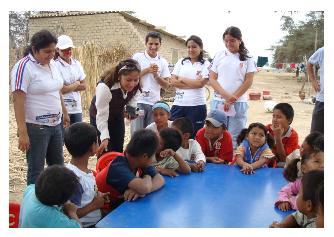Assistance Program for Local Development (PADEL)
Universidad Señor de Sipan
 The Assistance Program for Local Development (PADEL) at the Universidad Señor de Sipan in Peru promotes local development through the implementation of service-learning courses in every faculty. PADEL was formed in collaboration with the university, municipalities and civil society organizations and encompasses almost every community surrounding the university. Projects under the umbrella of PADEL include technical assistance for communities on the use of technology, training and management on the use of cultural resources for tourism and mentoring programs for children living in rural impoverished areas.
The Assistance Program for Local Development (PADEL) at the Universidad Señor de Sipan in Peru promotes local development through the implementation of service-learning courses in every faculty. PADEL was formed in collaboration with the university, municipalities and civil society organizations and encompasses almost every community surrounding the university. Projects under the umbrella of PADEL include technical assistance for communities on the use of technology, training and management on the use of cultural resources for tourism and mentoring programs for children living in rural impoverished areas.
USS is a relatively new school, and has made a concerted effort to connect with business, government, and community organizations, with a particular focus on local and regional development. In order to further this agenda, the university established PADEL. In choosing its development project, USS researched local and regional problems and consulted with community stakeholders. All projects have been established jointly with these stakeholders to make them both effective and sustainable. At the beginning of the program, participation by students was increased steadily, gradually occupying greater space. The first service-learning program created by USS was “Decreasing the Digital Divide,” which works to provide underprivileged areas with greater access to information technology, with an emphasis on improving community members’ digital literacy and awareness of the role IT can have in local development. The project won an award for regional development programs sponsored by the Interamerican Development Bank and the Andean Development Corporation, giving it increased recognition in the region. USS then decided to have each academic department create similar programs, and then began focusing on incorporating these projects into the curriculum as service-learning courses. Through connections with other service-learning practitioners in the region as well as its own experience, PADEL continues to improve its model and increase support among faculty and students. PADEL has become increasingly institutionalized at USS, with each academic school having at least one service-learning based solidarity project for community development.
The initiatives undertaken by PADEL focus on many aspects of regional development, including the improved access to IT that “Decreasing the Digital Divide” strives for. Another area emphasized by PADEL is tourism, which is a major engine of the local economy. One project in this area worked to create a strategic alliance between the Tumbas Reales Museum and several municipalities in the Zaña basin. Students worked with these partners to inventory the tourism resources in the region, make plans for promoting and expanding local tourism, and develop local tourism committees to execute these plans.
Projects like this not only benefit the community, but also give the students involved valuable experience that supplements their standard academic work. Evelleyn Bazán Zuloeta, a student participant in the project “Decreasing the Digital Divide” stated, “I was able to test my knowledge in the real world and make a difference to people who were close to me.” Juan Carlos Bautista Perez, Coordinator of the “Coping with Family Violence” program, says, “Leadership is a constant practice and leaving the classroom and dealing with the community is the best way to learn. Students learn that academic research and practice go hand in hand. Now the students aspire to work much harder for the community.” Students are so dedicated to the projects they have implemented that over 50% continue working with their community partners after the course ends.
Learn more at the PADEL website>>